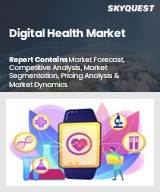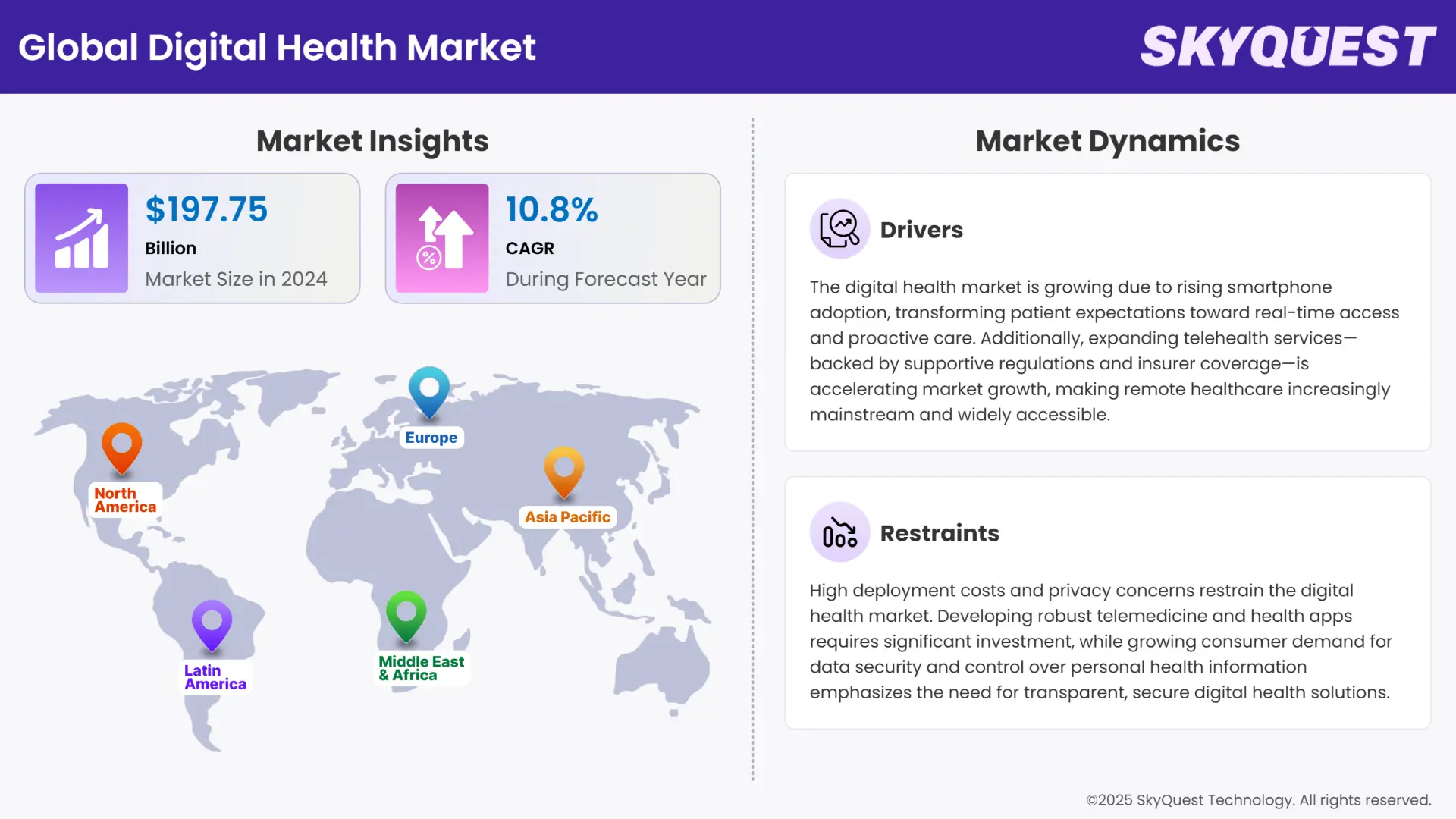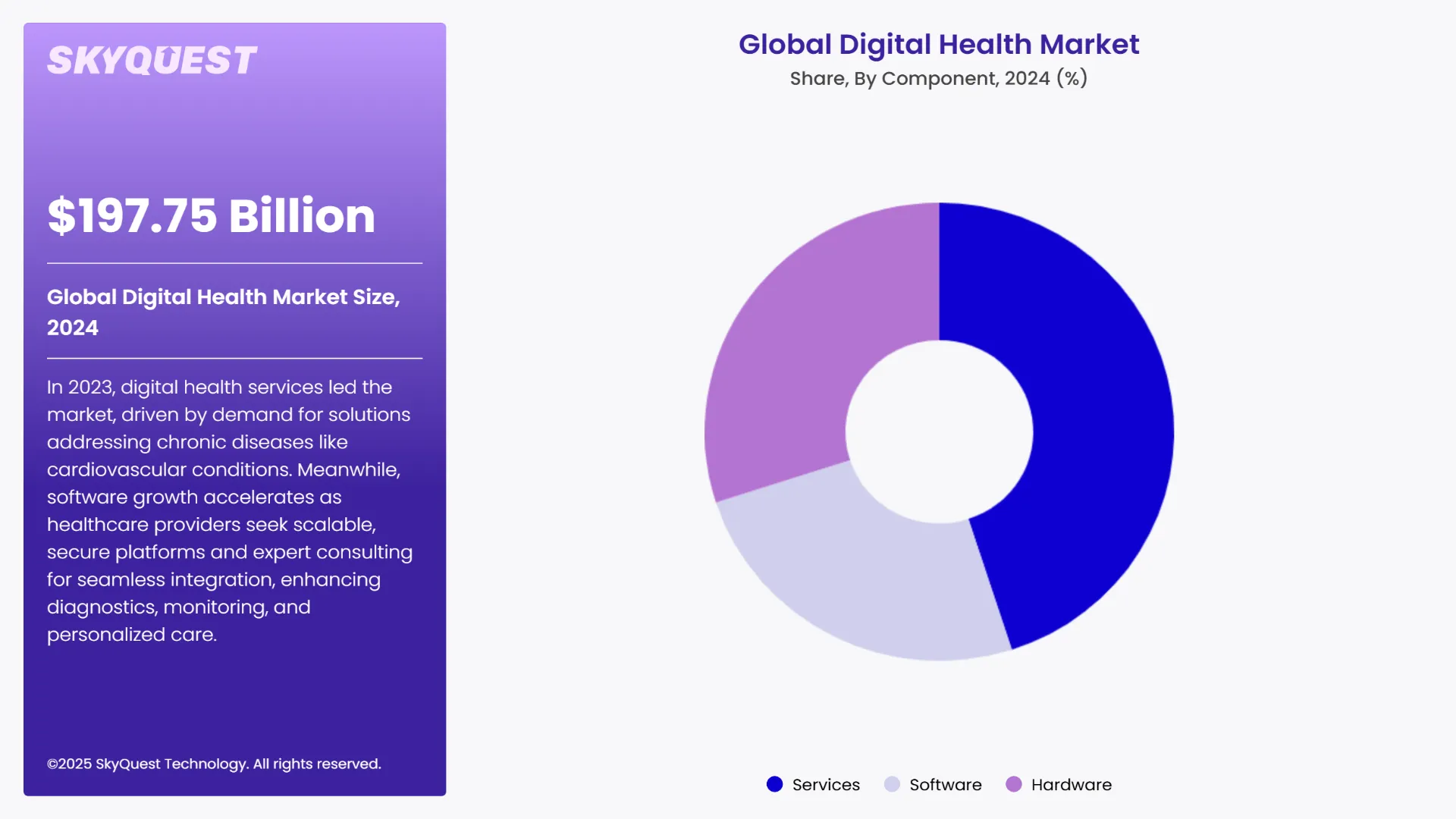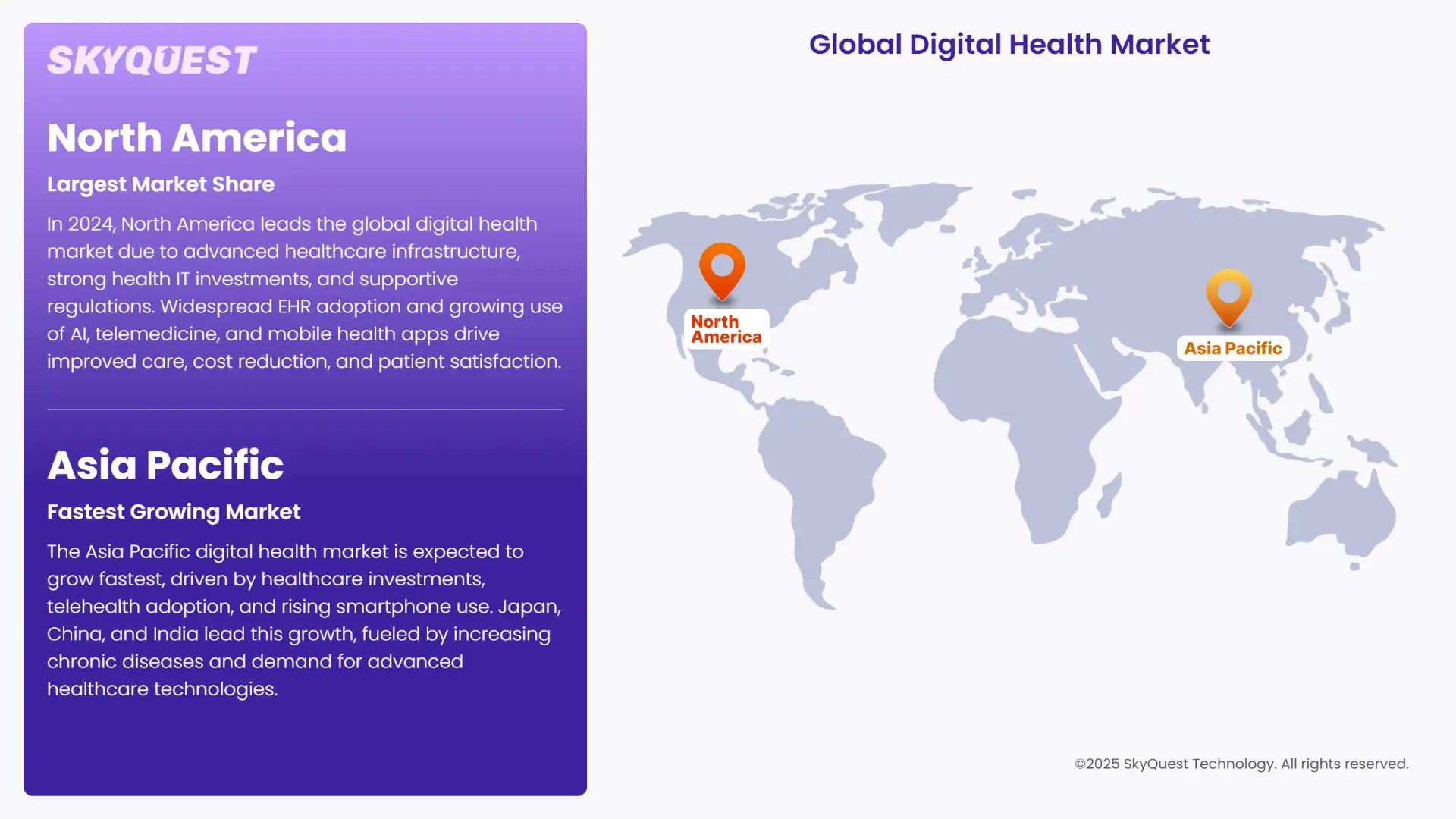
Report ID: SQMIG35G2310

Report ID: SQMIG35G2310
sales@skyquestt.com
USA +1 351-333-4748

Report ID:
SQMIG35G2310 |
Region:
Global |
Published Date: May, 2025
Pages:
192
|Tables:
64
|Figures:
75



Global Digital Health Market size was valued at USD 197.75 Billion in 2024 and is poised to grow from USD 219.11 Billion in 2025 to USD 497.71 Billion by 2033, growing at a CAGR of 10.8% in the forecast period (2026–2033).
Digital Health Market growth is largely driven by increasing consumer demand for personalized, efficient, and technology-enabled healthcare. The surge in chronic diseases and an aging population further amplifies the need for scalable solutions such as telemedicine, mobile health (mHealth) applications, and remote patient monitoring. Notably, mobile health adoption continues to grow, with over 350,000 mHealth apps now available in major app stores—almost double the number in 2015. In 2020 alone, 87 million U.S. adults engaged with health or fitness apps monthly, comprising 30% of adult smartphone users.
Consumer demand is accelerating innovation cycles across the industry, prompting digital health companies to mirror the speed of consumer electronics development. A SkyQuest study revealed that nearly 90% of respondents indicate a push toward faster product development, with 50% reporting development cycles of 18 months or less and nearly 20% achieving 12 months or less. Additionally, 92% of healthcare professionals believe the industry must adopt the agility of tech companies to meet evolving expectations. However, 90% of industry leaders also cite device interoperability as a major challenge, emphasizing the need for standardization to ensure seamless data integration.
Government initiatives play a pivotal role in propelling the market forward. In the U.S., the FDA's Digital Health Center of Excellence supports innovation and collaboration across stakeholders, while globally, the World Health Organization’s Global Initiative on Digital Health (GIDH), launched in 2024 with a US$ 4.03 million budget, is enhancing digital health infrastructure across countries. The GIDH plans to connect 60 health facilities to national electronic health record (EHR) systems and introduce a Digital Health Profile to support accessible, patient-centered care.
Despite these drivers, the high cost of deploying digital health solutions remains a key restraint. Telemedicine app development alone can cost between $100,000 and $500,000, while mHealth and fitness apps range from $80,000 to $300,000. Other critical applications such as appointment scheduling ($50,000–$150,000), e-prescription platforms ($70,000&;$200,000), medical reference tools ($60,000–$150,000), and patient engagement apps ($80,000–$250,000) further illustrate the substantial investment required. These financial burdens can hinder innovation, especially for smaller organizations, limiting broader access to advanced digital health technologies.
How AI is Enhancing Sustainability and Efficiency in the Digital Health Market?
Artificial Intelligence (AI) is rapidly transforming the global digital health market, acting as a critical driver of sustainability, efficiency, and innovation. By enhancing clinical workflows, enabling predictive care, and reducing resource consumption, AI is redefining how healthcare systems operate. AI-driven technologies are streamlining medical processes—from automating administrative tasks to optimizing diagnostic accuracy—resulting in reduced human error and improved patient safety. Our comprehensive analysis shows that AI is central to precision medicine, where its capacity to process vast, complex datasets is refining treatment strategies and tailoring care to individual patient profiles.
AI is also emerging as a powerful solution to bridge workforce gaps in the healthcare sector. With approximately 6.5 million healthcare professionals expected to leave the workforce by 2026 and only 1.9 million new entrants projected, the need for scalable support systems is urgent. AI-enabled clinical decision support tools empower physicians and nurses by providing real-time insights, risk predictions, and evidence-based recommendations—helping maintain quality care amid staffing shortages. These systems not only improve operational resilience but also alleviate pressure on healthcare workers, contributing to better work environments and patient outcomes.
In terms of sustainability and operational efficiency, AI is driving measurable progress. Between 2022 and 2023, healthcare institutions that adopted AI-optimized systems reported significant reductions in energy use, improved equipment utilization, and better resource allocation. Predictive analytics capabilities, for instance, allow for proactive equipment maintenance and adaptive scheduling, which minimizes downtime and maximizes system performance.
Furthermore, AI is contributing to greener healthcare practices by minimizing unnecessary testing, streamlining documentation, and promoting virtual care delivery—thus cutting down on physical infrastructure demands and associated environmental costs. By 2029, the AI healthcare technologies market is projected to reach $173.55 billion, reflecting its indispensable role in fostering a more efficient, sustainable, and patient-centric healthcare system.
AI and Infrastructure Advancements in Digital Health?
The digital health market is undergoing a significant transformation through AI-enabled infrastructure advancements, fundamentally reshaping how healthcare data is managed, delivered, and secured. Healthcare organizations are increasingly adopting AI-powered platforms to automate and optimize end-to-end processes—from clinical documentation and diagnostics to personalized patient communications and secure data archiving. Innovations such as intelligent data extraction, adaptive content generation, and context-aware information delivery are turning digital health systems into self-learning, responsive ecosystems that enhance both care quality and operational efficiency.
These advancements are particularly crucial in a healthcare landscape where vast volumes of data are generated daily—from electronic health records (EHRs) to diagnostic imaging and patient-reported outcomes. AI infrastructure enables real-time data processing and seamless integration across platforms, significantly improving care coordination and decision-making. Dynamic data routing, for instance, ensures that critical health information reaches the right stakeholders—patients, providers, or payers—at the right time and through the most appropriate channels, whether digital portals, mobile apps, or secure email.
In addition to performance enhancements, AI-driven infrastructure supports broader goals around sustainability and regulatory compliance. As healthcare systems face increasing pressure to minimize environmental impact and adhere to strict data governance standards, AI is becoming indispensable. Intelligent systems reduce redundant processes, lower energy consumption, and support paperless operations—all while strengthening cybersecurity protocols and ensuring data integrity.
Ultimately, the integration of AI into digital health infrastructure is not just an innovation—it's a necessity. It empowers healthcare organizations to scale services, safeguard patient data, and deliver personalized care more efficiently. This intelligent, agile, and sustainable foundation positions the digital health sector to meet the complex demands of modern medicine and evolving patient expectations.

To get more insights on this market click here to Request a Free Sample Report
The global Digital Health market is segmented based on Component, Technology, Application, End User, and Region. By Component, the market includes Hardware, Software, and Services. Based on Technology, the market is divided into Telehealthcare, mHealth, Digital Therapeutics, and Health Management Solutions. The Applications for this market include Chronic Disease Management, Behavioral Health, Health & Fitness, and Other Applications. The End Users are categorized into Providers, Payers, and Patients & Consumers. Geographically, it can be segmented into North America, Europe, Asia-Pacific, Latin America, and the Middle East and Africa (MEA).
In the year 2023, the Service segment held the largest digital health market share. The digital health market is experiencing robust growth, fueled by an urgent global demand for innovative healthcare solutions targeting critical health challenges, particularly chronic diseases like cardiovascular disease (CVD) and cancer. CVDs, which affected over half a billion people worldwide in 2023, remain a leading cause of mortality.
The World Health Organization attributes nearly one-third of global deaths to CVDs, with over 20.5 million deaths in 2021, marking a substantial rise from prior estimates. This growing CVD burden underscores the need for enhanced diagnostic tools, preventive measures, and efficient healthcare delivery systems. Digital health technologies, such as remote monitoring and AI-powered diagnostics, play a crucial role in managing CVD. These solutions allow for continuous monitoring, early detection, and personalized interventions, which are vital for controlling CVD progression and improving patient outcomes.
The software segment is emerging as a key accelerator of growth in the digital health market, driven by the increasing complexity of healthcare ecosystems and the need for scalable, interoperable, and secure digital solutions. As healthcare organizations expand their digital infrastructure to accommodate telemedicine, remote monitoring, and personalized care, the demand for robust software platforms—capable of seamless integration and compliance—continues to surge.
Implementation and consulting services are at the forefront, as healthcare providers seek expert guidance on deploying digital health platforms that align with existing electronic health records (EHRs), patient engagement systems, and regulatory frameworks. These services help organizations navigate the intricacies of software integration, workflow automation, and data governance, particularly in highly regulated sectors such as hospitals, clinics, and public health institutions.

To get detailed segments analysis, Request a Free Sample Report
North America continues to lead the global digital health market in 2024, supported by its advanced healthcare infrastructure, robust investment in health IT, and progressive regulatory environment. The region’s leadership is underpinned by the widespread adoption of electronic health records (EHRs), strong data privacy frameworks, and ongoing digital transformation initiatives across the healthcare continuum. Healthcare providers, payers, and tech companies in North America are increasingly investing in AI-powered health platforms, telemedicine services, and mobile health applications to improve care delivery, reduce costs, and meet evolving patient expectations.
U.S. Digital Health Market
The United States plays a pivotal role in driving this leadership, bolstered by federal support, such as funding for telehealth expansion and digital care innovation. In particular, the U.S. health and fitness segment has experienced explosive growth, with 368 million fitness app users and over 850 million app downloads in 2023 alone. This surge highlights a broader shift toward consumer-centric, personalized wellness solutions. Additionally, the U.S. telehealth sector is poised for significant expansion—from USD 28,183.29 million in 2023 to USD 67,531.83 million by 2031—driven by a 7.3% increase in national telehealth usage in early 2023 and strong demand from younger demographics, with 74% of millennials preferring virtual consultations over in-person visits.
Canada Digital Health Market
Canada is also slated to emerge as a highly rewarding market for digital health companies as digitization of healthcare picks up pace. Growing adoption of electronic health records and government efforts to promote digital health adoption are also slated to offer new business scope for companies.
As per Canadian Social Survey (CSS): Quality of Life, Virtual Health Care and Trust, just over 50% of Canadians of the age of 15 and older reported accessing electronic health information in the past 12 months. The data was collected from July to September 2023.
The Asia Pacific region is estimated to emerge as the fastest growing digital health market companies in the world. Growing investments in healthcare infrastructure development, high popularity of telehealth practices, and growing smartphone penetration are slated to help this region generate new opportunities. Japan, China and India are slated to be top countries in this region owing to growing prevalence of chronic diseases and rising demand for advanced healthcare technologies.
Japan Digital Health Market
Japan is slated to emerge as a beneficial country for digital health providers owing to the presence of a high geriatric population base and their need for better care and disease management. Quick adoption of wearable medical devices and health trackers coupled with the launch of new initiatives to promote digitization of healthcare are also estimated to offer new business scope for digital health market players.
China Digital Health Market
Growing internet and smartphone penetration coupled with the presence of key digital health companies such as Alibaba Health, Ping An Doctor, and JD Health among others is expected to help this country boost digital health adoption in the long run. Launch of initiatives such as Internet Plus Healthcare to promote digital health by the Chinese government is also expected to create new business scope through 2032.
India Digital Health Market
Growing emphasis on healthcare infrastructure development, rising healthcare spending from patients, and high demand for advanced digital health solutions are expected to boost digital health adoption in India. Launch of several new government initiatives such as Ayushman Bharat Digital Mission (ABDM) and eSanjeevani telemedicine platform are also expected to expand the application scope of digital health offerings in the country.
When compared to North America and Asia Pacific, the EU digital health market is slated to be seen as a moderately opportune market for digital health companies. Surging adoption of advanced healthcare technologies, growing emphasis on improving patient outcomes, and high adoption of wearable devices are helping this region generate new opportunities.
Germany Digital Health Market
Germany is slated to emerge as a highly rewarding country in this region for digital health companies. The growing aging population, high preference for remote healthcare, and launch of new legislations and regulations in favor of digital health are offering new opportunities.
In an effort to make Germany’s healthcare more digital, the country enforced the Act to Accelerate the Digitalisation of the Healthcare System (Digital Act – DigiG) in March 2024. The act is aimed at improving adoption of digital health solutions such as electronic patient records (ePA) in the country.
Spain Digital Health Market
Increasing life expectancy of people in Spain has led to a major surge in geriatric population. This coupled with presence of digital health startups and a strong supportive regulatory framework for digital health adoption are helping Spain emerge as a highly opportune country.
As per Dealroom.co's Entrepreneurship Map (Plataforma ONE) database, more than 2,100 startups and scaleups in the Spanish digital health industry attracted more than 114 million euros in 2024.
The Middle East and Africa regions are slated to create new business scope for digital health providers in the long run. High emphasis of governments in this region to improve healthcare infrastructure and accessibility is helping create new opportunities for digital health adoption. Saudi Arabia and the United Arab Emirates are slated to emerge as top countries in this region, owing to rapid urbanization and digital transformation.
Saudi Arabia Digital Health Market
Efforts of Saudi government to modernize and improve their healthcare infrastructure, high smartphone penetration, and emphasis on enhancing healthcare accessibility in the country are creating an opportune setting for digital health providers in the long run. Under The Saudi Vision 2030 initiative, the Ministry of Health (MOH) of Saudi Arabia is focusing on improving the adoption of digital health technologies to enhance patient outcomes and ensure better care delivery.

To know more about the market opportunities by region and country, click here to
Buy The Complete Report
Increasing penetration of smartphones and mobile platforms
Expanding telehealth and telemedicine
High cost of deploying digital health solutions
Privacy and Security Concerns
Request Free Customization of this report to help us to meet your business objectives.
Based on our evaluation of companies that have managed leading digital health market share and very important innovative products in the global marketplace through a series of innovation analysis conducted by Skyquest Technology on the Digital Health universe, the top three highest scored companies are International Business Machine Corporation (IBM), GE Healthcare, and Microsoft Corporation. IBM includes businesses like US-based multinational technology entities across digital health solutions or offers pioneering advances in AI-driven healthcare analytics. It works to improve patient outcomes, operational efficiency, and new ways to improve the standard of care for healthcare. Based in the USA, GE Healthcare is a leading company engaged in medical imaging, diagnostics, and digital health platforms.
The ceaseless improvement of next-generation technologies vis-a-vis medical imaging systems, as well as data analysis, significantly affects the decisions made at the clinical level. It is another major American technology giant visiting dreams and rosy ambitions with its Azure Cloud Service under health and AI-powered health services. The suite of services they provide in data management, telehealth, and interoperability allows many different healthcare organizations around the world to build very powerful capabilities. These companies are following their innovation journey and leading the Digital Health Market with advances in technology and putting customers' needs and wants first. Thus, the industry grows and competes on a global level.
Emerging Trends Shaping the Future of Digital Health
SkyQuest’s ABIRAW (Advanced Business Intelligence, Research & Analysis Wing) is our Business Information Services team that Collects, Collates, Correlates, and Analyses the Data collected using Primary Exploratory Research backed by robust Secondary Desk research.
According to our analysis, the Digital Health market is undergoing a significant transformation driven by various factors. The growing adoption of advanced technologies such as artificial intelligence (AI), telehealth, and wearable devices is revolutionizing healthcare delivery and management. The increasing demand for remote patient monitoring, electronic health records (EHRs), and personalized healthcare solutions is propelling market growth. Regionally, North America leads the market due to a strong healthcare infrastructure and rapid technological adoption, while Asia-Pacific follows closely, driven by expanding healthcare digitization initiatives and rising investments in health IT.
However, the market is highly fragmented, with numerous local and international players competing for market share. Key factors influencing competition include technological innovation, data security, interoperability, and regulatory compliance. Challenges such as data privacy concerns, varying healthcare standards across regions, and high implementation costs may hinder market expansion. Leading players are pursuing strategic initiatives, including product development, partnerships, and geographic expansion, to strengthen their positions. Additionally, the industry is witnessing a shift towards patient-centric digital health solutions, catering to individual healthcare needs and preferences, further driving market growth.
| Report Metric | Details |
|---|---|
| Market size value in 2024 | USD 197.75 Billion |
| Market size value in 2033 | USD 497.71 Billion |
| Growth Rate | 10.8% |
| Base year | 2024 |
| Forecast period | 2026-2033 |
| Forecast Unit (Value) | USD Billion |
| Segments covered |
|
| Regions covered | North America (US, Canada), Europe (Germany, France, United Kingdom, Italy, Spain, Rest of Europe), Asia Pacific (China, India, Japan, Rest of Asia-Pacific), Latin America (Brazil, Rest of Latin America), Middle East & Africa (South Africa, GCC Countries, Rest of MEA) |
| Companies covered |
|
| Customization scope | Free report customization with purchase. Customization includes:-
|
To get a free trial access to our platform which is a one stop solution for all your data requirements for quicker decision making. This platform allows you to compare markets, competitors who are prominent in the market, and mega trends that are influencing the dynamics in the market. Also, get access to detailed SkyQuest exclusive matrix.
Table Of Content
Executive Summary
Market overview
Parent Market Analysis
Market overview
Market size
KEY MARKET INSIGHTS
COVID IMPACT
MARKET DYNAMICS & OUTLOOK
Market Size by Region
KEY COMPANY PROFILES
Methodology
For the Digital Health Market, our research methodology involved a mixture of primary and secondary data sources. Key steps involved in the research process are listed below:
1. Information Procurement: This stage involved the procurement of Market data or related information via primary and secondary sources. The various secondary sources used included various company websites, annual reports, trade databases, and paid databases such as Hoover's, Bloomberg Business, Factiva, and Avention. Our team did 45 primary interactions Globally which included several stakeholders such as manufacturers, customers, key opinion leaders, etc. Overall, information procurement was one of the most extensive stages in our research process.
2. Information Analysis: This step involved triangulation of data through bottom-up and top-down approaches to estimate and validate the total size and future estimate of the Digital Health Market.
3. Report Formulation: The final step entailed the placement of data points in appropriate Market spaces in an attempt to deduce viable conclusions.
4. Validation & Publishing: Validation is the most important step in the process. Validation & re-validation via an intricately designed process helped us finalize data points to be used for final calculations. The final Market estimates and forecasts were then aligned and sent to our panel of industry experts for validation of data. Once the validation was done the report was sent to our Quality Assurance team to ensure adherence to style guides, consistency & design.
Analyst Support
Customization Options
With the given market data, our dedicated team of analysts can offer you the following customization options are available for the Digital Health Market:
Product Analysis: Product matrix, which offers a detailed comparison of the product portfolio of companies.
Regional Analysis: Further analysis of the Digital Health Market for additional countries.
Competitive Analysis: Detailed analysis and profiling of additional Market players & comparative analysis of competitive products.
Go to Market Strategy: Find the high-growth channels to invest your marketing efforts and increase your customer base.
Innovation Mapping: Identify racial solutions and innovation, connected to deep ecosystems of innovators, start-ups, academics, and strategic partners.
Category Intelligence: Customized intelligence that is relevant to their supply Markets will enable them to make smarter sourcing decisions and improve their category management.
Public Company Transcript Analysis: To improve the investment performance by generating new alpha and making better-informed decisions.
Social Media Listening: To analyze the conversations and trends happening not just around your brand, but around your industry as a whole, and use those insights to make better Marketing decisions.
REQUEST FOR SAMPLE
Digital health refers to the use of digital technologies including mobile health apps, telemedicine platforms, AI diagnostics, and wearable devices to enhance healthcare delivery and patient engagement. In 2025, it's enabling personalized care, reducing wait times, and increasing access to specialists across geographies.
Key technologies include artificial intelligence (AI), machine learning, IoT-enabled wearables, blockchain for secure health records, and augmented reality (AR) for surgical simulations. These innovations streamline workflows and improve diagnostic accuracy.
AI improves diagnostics through image recognition, predicts patient deterioration via wearable data, and facilitates real-time virtual triage. It makes remote care smarter and more responsive.
Governments are introducing stricter data standards, incentivizing telehealth, and defining frameworks for AI ethics. In the EU, GDPR compliance is key, while the U.S. sees growth under HIPAA-compliant platforms.
Want to customize this report? This report can be personalized according to your needs. Our analysts and industry experts will work directly with you to understand your requirements and provide you with customized data in a short amount of time. We offer $1000 worth of FREE customization at the time of purchase.
Feedback From Our Clients